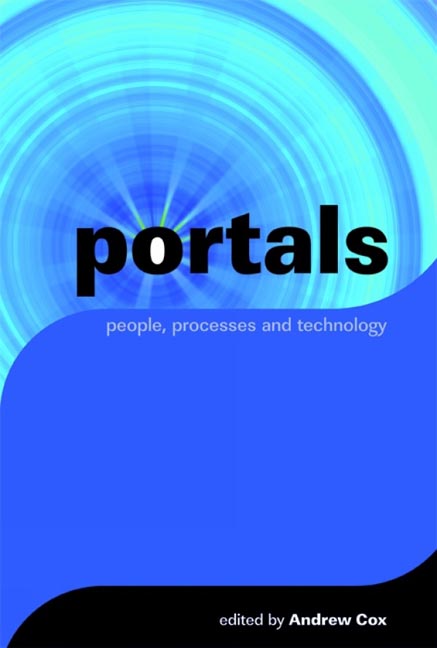Book contents
- Frontmatter
- Contents
- Introductory preface
- Section 1 Core themes
- Section 2 The library and the portal
- Section 3 The portal in the corporate sector
- Section 4 Portals in the public sector
- 12 Community portals and the e-Confluence Zone: where bottom-up meets top-down
- 13 Portal implementation in UK higher education institutions: a comparative analysis
- 14 MyUU: a case study of the Utrecht University portal
- Section 5 The future
- The contributors
- Index
13 - Portal implementation in UK higher education institutions: a comparative analysis
from Section 4 - Portals in the public sector
Published online by Cambridge University Press: 09 June 2018
- Frontmatter
- Contents
- Introductory preface
- Section 1 Core themes
- Section 2 The library and the portal
- Section 3 The portal in the corporate sector
- Section 4 Portals in the public sector
- 12 Community portals and the e-Confluence Zone: where bottom-up meets top-down
- 13 Portal implementation in UK higher education institutions: a comparative analysis
- 14 MyUU: a case study of the Utrecht University portal
- Section 5 The future
- The contributors
- Index
Summary
Introduction
At the height of the dot.com bubble, portal technology was hailed as the transformational force that would change higher education institutions (HEIs) forever. In streamlining business information processes and offering members of the university a one-stop-shop experience, it was claimed that the institutional portal would act as the catalyst catapulting institutions into the new millennium. Consequently, universities worldwide have started to form collaborations and networks to explore and develop this technology and specifically plan to make it a key institutional platform.
The research reported in this chapter investigates the implementation of portal systems in UK HEIs between December 2003 and June 2004. It covers 45 universities and two university sector colleges in the UK for a comprehensive representation of the sector. It establishes a practical and realistic overview of the real progress of portal development and integration at British universities. How far has the much promised seamless integration of different software into one big network with a single sign-on facility been accomplished? What kind of problems or obstacles and also advantages have been identified? What does the pattern of past progress suggest about how future development will proceed?
Methodology
Methodologically, the research draws on previous work in the area of portal development and integration in large organizations and on organizational theory (Katz, 2002; Strauss, 2002), as well as of principles and types of information portals and managed learning environments in general (Britain and Liber, 1999; Davydov, 2001; JISC, 2001) and in specialized portal solutions specifically (Cox and Yeates, 2002).
Empirical research for this study involved the evaluation and analysis of the development of institution-wide portal systems, acting as an umbrella structure for the underlying information system configuration of the university. The research addresses a debate over the stage of portal integration in higher education and the progress they have made, using ethnographic observation strategies, as well as semistructured and unstructured interview techniques. The research also took a comparative approach, involving the systematic comparison of different university systems to understand their similarities and differences and how they interrelate to each other and are integrated in a portal environment. The research draws also on a historical approach to understand the context within which the portal concept has emerged and how it is pursued today.
- Type
- Chapter
- Information
- Portalspeople, processes and technology, pp. 167 - 187Publisher: FacetPrint publication year: 2006
- 1
- Cited by



